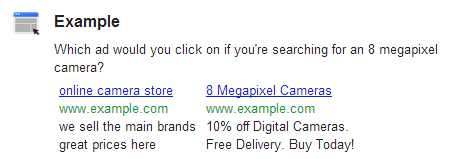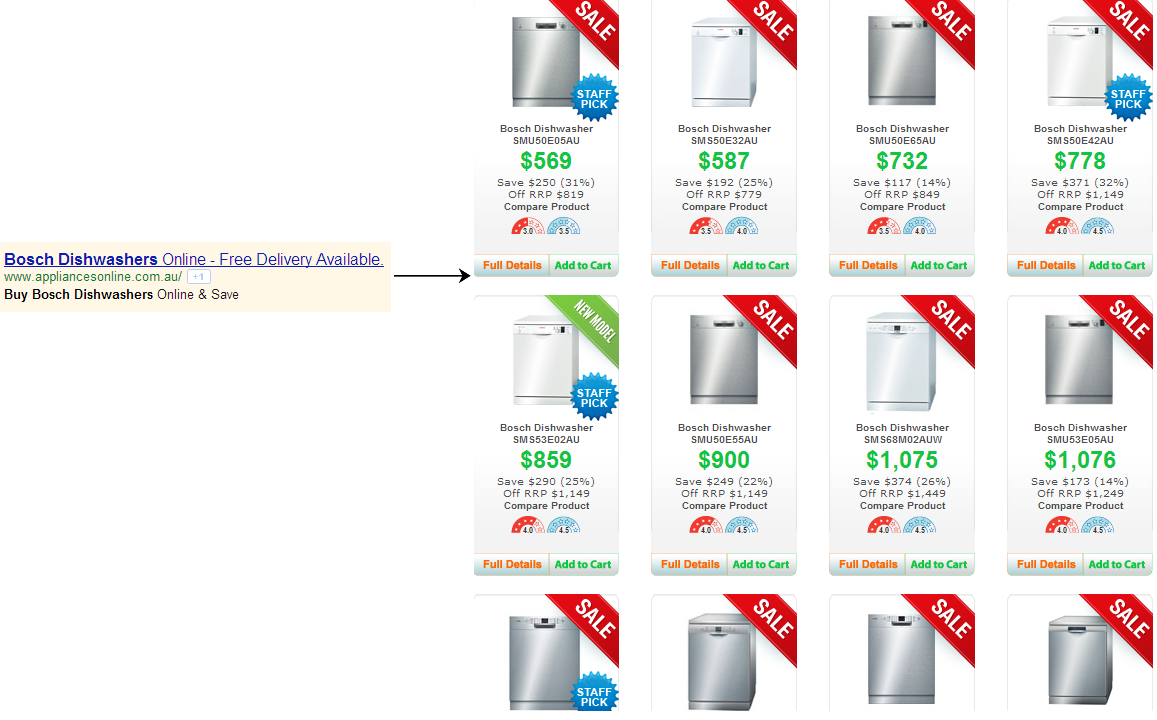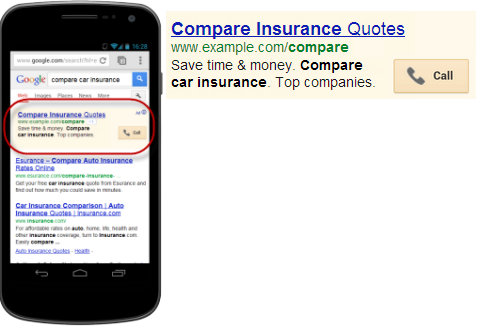Make Your PPC Ad Attractive and Effective
Some people think that creating a PPC ad is easy, after all there are
only a few words to pick from, right? So how hard can it be?
Well, if you’ve ever sat down to write one, you’ll find that contrary to what ‘
they’
say, writing an attractive, relevant and conversion friendly ad can in
fact cause severe nail biting, rigorous hair pulling and an unrelenting
desire to write a nice long blog post that isn’t constricted by a
character limit.
Particularly if writing isn’t your forte, writing for PPC ads can be
frustrating. Ad’s are restricted to 25 characters for the headline and
35 characters for each line of description. That’s not much to work with
so, you really need to maximise the space you have. The following list
will demonstrate exactly how you make the most of the 95 odd characters
you have in order to improve not only the click through rate, but also
the conversion rate once people have landed on your website.
1. Choose your keywords well
Keywords are at the centre of any search marketing strategy because
the right keyword will maximise your chances of delivering the ad to the
right person. Because keyword selection will depend on the customer and
what they’re likely to search for, make sure that you do your research
first before creating your ad. You can read more about this on my
previous post on
Why You Need Keywords.
This is pretty self explanatory. The headline is the first thing
people will see so it’s imperative that you get it right. The best way
to get the most out of the headline is to include the keyword you’re
targeting. By including the keyword, you’re addressing what the user
searched for which makes the ad more relevant to them, which in turn
makes them more likely to click and convert.
PROT TIP: Just capitalising each word can make the ad stand out as you can see in the image below. Simple, yet effective.
 3. Highlight your unique selling proposition in the ad copy
3. Highlight your unique selling proposition in the ad copy
What makes your product or service unique? Is it a wide range of
brands, free, overnight shipping, a 100 day returns policy perhaps?
Whichever one it is, make sure that you highlight it because it will
determine whether the customer buys from you and
not from your competition.
4. Ensure landing pages are optimised
Now that you’ve determined your keywords and created
some kick-ass awesome copy, your ad is most likely looking lovely and
clickable. But what happens next? It’s one thing to create an awesome ad
that drives massive traffic numbers but if it doesn’t convert, what’s
the point? This is where landing pages come in.
The purpose of the landing page is to convert the traffic generated
from the ad into a lead or sale. Sure, you can direct the traffic to
your homepage but it’s not a good idea because homepages can be
overwhelming (particularly on E-Commerce sites) and the user is likely
to bounce before making any kind of purchase. Consider for example that
you searched ‘red converse shoes’. The ad below turns up:

You think ‘perfect, this is exactly what I need’ so you click on it
and you’re taken to…the very busy, very confusing home page with shoes,
bags, jackets and pretty much everything else the site seems to offer.
What next? Do you do a product search? Do you navigate your way through 4
odd steps to find red converse shoes? Most people would simply get
confused and go back to their original search to find a more relevant
website and you’re left with no conversions and a mounting PPC bill.
Instead, you want to make it as easy as possible for the user to
follow through. To do this, ensure that your ad copy is consistent with
the landing page it links to. Appliances Online does this really well.
If you do a search for ‘buy bosch dishwasher’ for example, you’re
directly taken to a landing page with only Bosch dishwashers (see below)
– not one with a range of Bosch, Fisher & Paykel, Miele and LG
varieties, nor one with Bosch vacuum cleaners, microwaves and ovens. As a
result, buyers will find what they want immediately, and be more likely
to head to your checkouts just as quickly.
 5. Include a strong call-to-action
5. Include a strong call-to-action
Much like all forms of marketing, a call to action is important for
an effective PPC ad. Put yourself in the position of the customer and
think about why you should click on the ad that very second. To
encourage the user to click the ad there and then, you need to create a
sense of urgency and tell users exactly what you want them to do. This
is called a call to action.
Some effective calls to action include:
- Get your free eBook right now
- Sign up now for 20% off the entire range
- Call now for your free consultation
Compare this to the more generic calls to action like:
- Visit our website
- Click here
Clearly the former has a much higher chance of not only encouraging a
user clicking on the ad, but also of converting the user into a
customer once they’re on the landing page.
6. Make the most of ad extensions
Ad extensions allow you to include more information in your existing
PPC ad – without going over the character limit. A discussion of this
awesome feature is worthy of its own blog post so I won’t go into too
much detail just yet but a few key points are worth noting.
First, ad extensions can increase the click-through rate, decrease
the cost per acquisition and improve the conversion rate of the ad,
while the cost per click remains EXACTLY the same as it would without
the extension. Win.
Second, you can select an extension based on the action you’d like
the user to take. For example, a ‘call extension’ would include the
business’ phone number so the user can call directly from their mobile
without having to go onto the website. This is particularly useful for
those emergency businesses like plumbers or the NRMA whose customers are
usually in a bit of a pickle when they want to call them. When you have
an over flowing toilet or a broken down car, you don’t really want to
search through a website to find a contact number so this ad extension
is perfect for converting the right customers.
There are 6 ad extensions to choose from all together, so I suggest having a look on the Google AdWords support page ‘
Enhance your ad using extensions’ to get the low down on each one.
7. Test, test and when you think you’ve done enough testing, test some more
Try as you might to put yourself in the customers shoes, your
intuition about what they want may not always be the best option. For
example, they might prefer a more subtle, soft approach while you fancy
direct and aggressive tones. In order to mitigate the risk of alienating
a large chunk of your potential market therefore, you should always
test different tones. During this experimentation process, create a few
ads in each ad group and develop a different message for each. Figure
out which one works best by analysing your AdWords statistics and model
your campaign accordingly. Easy!
Hopefully these 7 pieces of PPC wisdom will help you maximise your
next campaign but if you’re still struggling, fell free to give us a
call to see how we can help!









